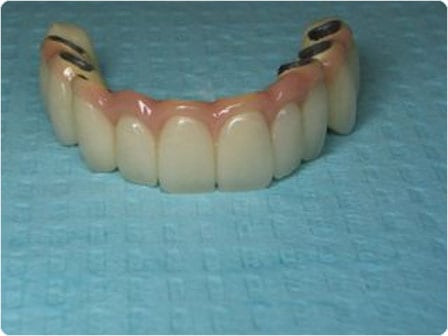Differences between implants and dentures
According to the American Association of Oral and Maxillofacial Surgeons, statistics show that nearly 70% of adults aged 35 to 44 years in the United States have at least one missing tooth due to an accident, tooth decay, gum disease, or dental fractures.
But there’s no need to go through life with missing teeth. These days, many good alternatives are available. Dental implants and dentures are the most common options. Dentures are false teeth, and although their quality has improved, they’re not ideal for everyone.
If not secured with denture adhesive, dentures might slip out of place while eating or speaking, which is embarrassing, and partial dentures might promote infection and decay in other teeth if they aren’t fitted properly, which may increase the risk that you would need a tooth filling on the abutment (adjoining) tooth. That said, dentures may be the best choice for people whose gums and jaw are weak or unhealthy.
If you are missing teeth and your gums and jaw are healthy, you may benefit from dental implants, which are replacement teeth that are implanted surgically into the jawbone. With good oral hygiene, dental implants can last for 20 years or more without the need for replacement.
Dental implants are often a popular choice for people who have only one or two teeth missing, but they can be an alternative to dentures if you have several missing teeth. As long as your gums and jaw are healthy, two or more implants can serve as a base of support for several replacement teeth.
Differences and Important Facts about Dentures vs. Implants
Your health is a priority – Having diseased teeth can put your overall health and comfort at risk. Dental infections are a problem for your whole body. Don’t live with painful, unhealthy, and unattractive teeth. Whether you decide to get implants or dentures, both can help eliminate gum disease and dental decay.
Dental Implants CAN be done later – In many cases you will need to have dentures for a period of time before implants are placed. Some clients prefer to have dentures made first, evaluate how they feel and how they like dentures, then decide on implants later. This allows time for you to know whether you would like two implants, five, upper or lower implants. You need to heal from having teeth removed and it helps to give your body some time.
For most types of implant dentures, you are not causing any harm by waiting for some time before proceeding with implants.
Dentures can be successful without implants – Many clients are very satisfied with their dentures. Upper dentures are usually fairly easy to wear and look great. Most people do not choose to get implants in their upper jaws because their dentures are a cost-effective and esthetic solution.
If a client wants dental implants it is usually for the lower jaw. Lower dentures are generally not as stable as upper dentures and can benefit from at least two dental implants to help stabilize them.
Things to think about when preparing for an implant
Consider choosing a specialist for your treatment – The training and experience level of dentists can vary significantly. Three types of specialists receive extensive clinical training in implant treatment: oral surgeons, periodontists, and prosthodontists.
There are more than 100 manufacturers of implants. They are all slightly different. Think about your implant twenty years from now. Should something happen and new crown abutments or denture attachments are needed – will they be available? Does your implant’s brand have adequate research and a history of success? Will your dentist be able to tell what type of implant you have? We will keep detailed records of all your implant’s information, and provide you with these records in case you move or transfer care.
Not all implant treatments are the same – There are many different ways to place implants. Implants can be placed on the same day as your teeth are removed, they can have a temporary crown or denture placed at the same time.
However, there are benefits and risks for all of the different techniques. You need to ask your dentist about the options, the risks, and how your mouth and health impacts these different plans. Demand more information, especially if you don’t know how your implant will be placed and finished, and why.
There is a HUGE difference between a “fixed bridge” and “overdenture” which some falsely call a “removable bridge”
Look at these pictures:

An overdenture is just that a denture that goes over implants and it is removable. It must be taken out at night and cleaned underneath.

Fixed bridges are cemented or screwed to the implants and cannot be removed by you. Unlike dentures that have pink acrylic and plastic teeth, fixed bridges are porcelain fused to metal or Zirconia bridge.
Overdentures can be made with porcelain teeth, but that only makes the dentures look better.
If you are missing a little bit of gum, I usually make pink ceramic porcelain near your natural gum line. This will make it so the teeth don’t look too long and square. Having that little triangle of gum between the teeth makes all the difference when you smile.
Services
Working Time
- Monday - Friday: 08:00 - 19:00
- Saturday: 08:00 - 18:00
- Sunday closed
Contact Info
- Hotline 1: (+84) 908 321 455
- Hotline 2: (+84) 931 857 885
- Mobile: (+84) 8 3925 8778
- Phone: (+84)2 838 258 778
- info@dentalrose.net
- rosedentalclinicvn@gmail.com
 English
English  Tiếng Việt
Tiếng Việt

